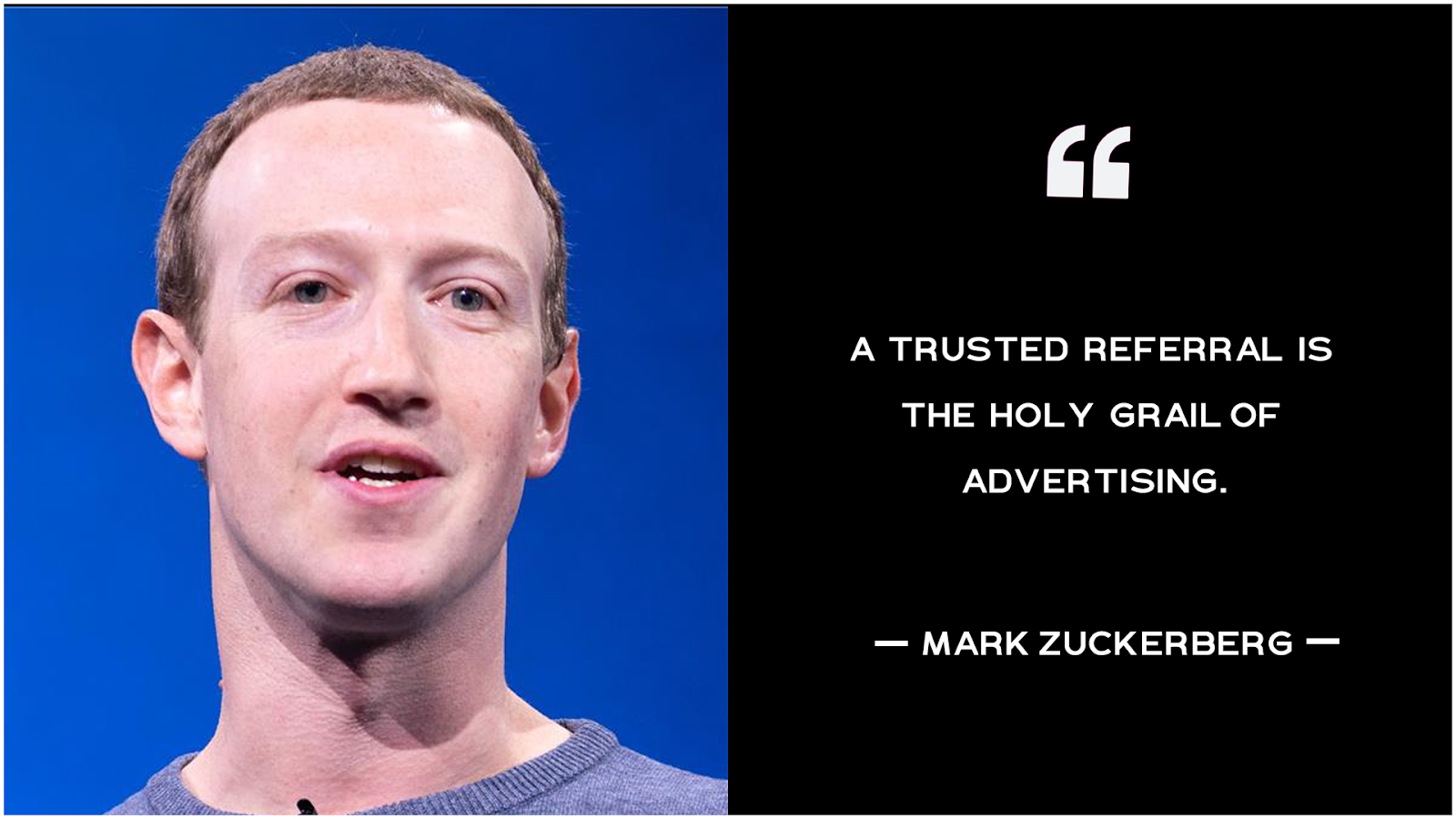Table of Contents
Introduction
Referral marketing is one of the most powerful and cost-effective ways to attract new customers, retain existing ones, and enhance brand loyalty. With minimal effort, you can leverage your existing customer base to spread the word about your brand, making the lead acquisition process more organic.
Referral marketing leverages one of the oldest and most effective forms of advertising: word of mouth. It turns satisfied customers into passionate brand advocates, who recommend your products or services to friends, family, and colleagues.
In this blog, we’ll walk you through everything you need to know—from understanding how referral marketing works and why it’s so effective, to building and optimizing your referral program.
What Is Referral Marketing
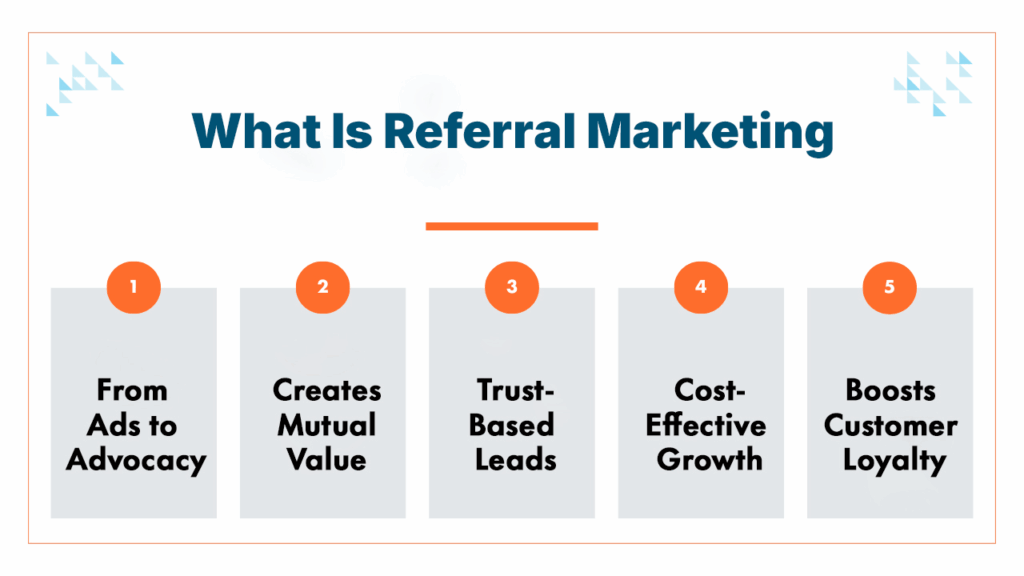
Referral marketing works by turning your existing customers into brand advocates who willingly share your product or service with people they trust.
- From Ads to Advocacy: Instead of relying on traditional ads, referral marketing motivates customers to spread the word by offering meaningful rewards—such as discounts, cashback, free products, or exclusive perks—for each successful referral.
- Creates Mutual Value: Referral programs benefit both businesses and customers. While customers enjoy tangible incentives, businesses gain new leads through trusted, organic promotion, often at a lower acquisition cost than paid advertising.
- Trust-Based Leads: Unlike conventional marketing, referral strategies harness personal relationships and word-of-mouth trust. This results in more qualified, high-intent leads who are more likely to convert and remain loyal.
- Cost-Effective Growth: Referral marketing often costs less than traditional advertising while delivering better ROI through trusted recommendations. This makes it an efficient way to scale your business without overspending.
- Boosts Customer Loyalty: Offering rewards for referrals encourages repeat engagement and strengthens brand loyalty. Happy customers become ongoing advocates who are more likely to stick around and promote your brand.
Types of Referral Marketing
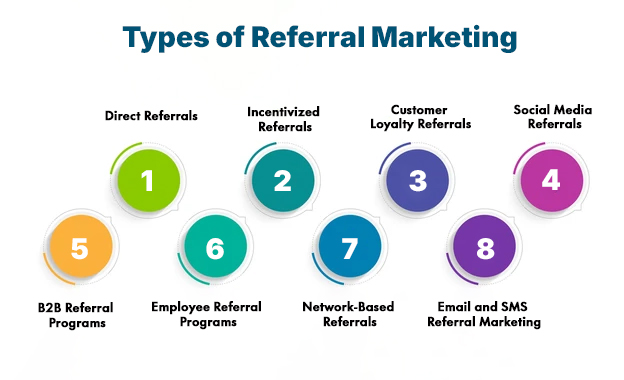
Referrals create powerful partnerships that benefit both your brand and your customers when implemented effectively. Based on your industry, target market, and goals, you can choose from a variety of referral marketing strategies tailored to your needs.
Here are some common types and how they work:
- Direct Referrals: They occur naturally when satisfied customers share their positive experiences with friends, family, or colleagues purely because they genuinely appreciate your product or service.
- Incentivized Referrals: Rewards can vary from discounts, store credits, cashback, free products, to exclusive experiences. Well-designed incentive programs encourage repeat participation and sustained advocacy.
- Customer Loyalty Referrals: Loyal customers can become repeat referrers with tiered rewards—more referrals earn greater rewards, strengthening brand connection and long-term engagement.
- Social Media Referrals: Social media makes it easy for customers to share referral links with their networks. Contests, hashtags, and shareable codes can quickly boost your program’s reach.
- B2B Referral Programs: In B2B, referrals stem from trusted relationships and often lead to high-value deals. Companies recommend complementary services, forming mutually beneficial partnerships.
- Employee Referral Programs: Employees can act as brand ambassadors, bringing in new customers or hires through structured referral incentives. These programs foster internal engagement while tapping into employees’ networks for quality leads or talent.
- Network-Based Referrals: Some companies build exclusive, invite-only communities where members refer like-minded individuals to join. This approach relies heavily on trust and shared interests, creating a strong sense of belonging.
- Email and SMS Referral Marketing: Many businesses use targeted email and SMS campaigns to distribute referral links and promotional offers.
How to Build a Referral Program
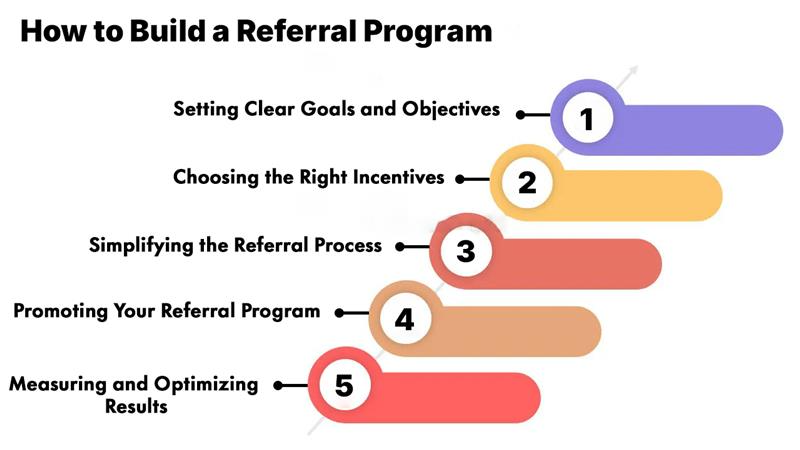
Creating a successful referral program requires thoughtful planning, clear goals, and a smooth customer experience. Here’s a step-by-step guide to building a referral program that motivates your customers to become passionate advocates for your brand.
Setting Clear Goals and Objectives
Before launching your referral program, define what you want to achieve. Setting measurable goals helps you design a program tailored to your business needs and track its success effectively.
Example goals:
- Generate 200 new customer referrals in 3 months
- Increase referral-driven sales by 25% in 6 months
- Improve customer retention rate through referral incentives
Choosing the Right Incentives
Selecting appealing rewards is key to motivating your customers to participate. Incentives can range from discounts, cashback, store credits, exclusive access, to free products or services. Consider your audience’s preferences and what aligns with your brand’s value proposition.
Tips:
- Offer rewards that feel valuable but sustainable for your business
- Use dual incentives that reward both referrer and referee
- Experiment with tiered rewards to encourage multiple referrals
Simplifying the Referral Process
A complicated referral process can discourage participation. Make it as easy as possible for customers to refer others by providing simple sharing options and clear instructions. This includes easy-to-use referral links, social sharing buttons, and mobile-friendly interfaces.
Best practices:
- Provide a personalized referral link or code for each customer
- Allow sharing via email, SMS, and social media platforms
- Include step-by-step guides or FAQs for users new to referral programs
Promoting Your Referral Program
Even the best referral program needs promotion to gain traction. Use multiple marketing channels to spread the word and remind customers about the benefits of participating.
Promotion ideas:
- Announce your program via email newsletters and social media
- Highlight the referral program during the checkout process
- Use in-app notifications or push messages if you have a mobile app
Measuring and Optimizing Results
Tracking the performance of your referral program is essential for continual improvement. Use analytics to monitor key metrics such as the number of referrals, conversion rates, and customer lifetime value.
Metrics to track:
- Number of referrals generated
- Conversion rate of referred leads
- Average value of referred customers
Regularly review this data to identify what’s working and where adjustments are needed. Experiment with different incentives, messaging, or referral channels to optimize engagement and maximize ROI.
Importance of Referral Marketing
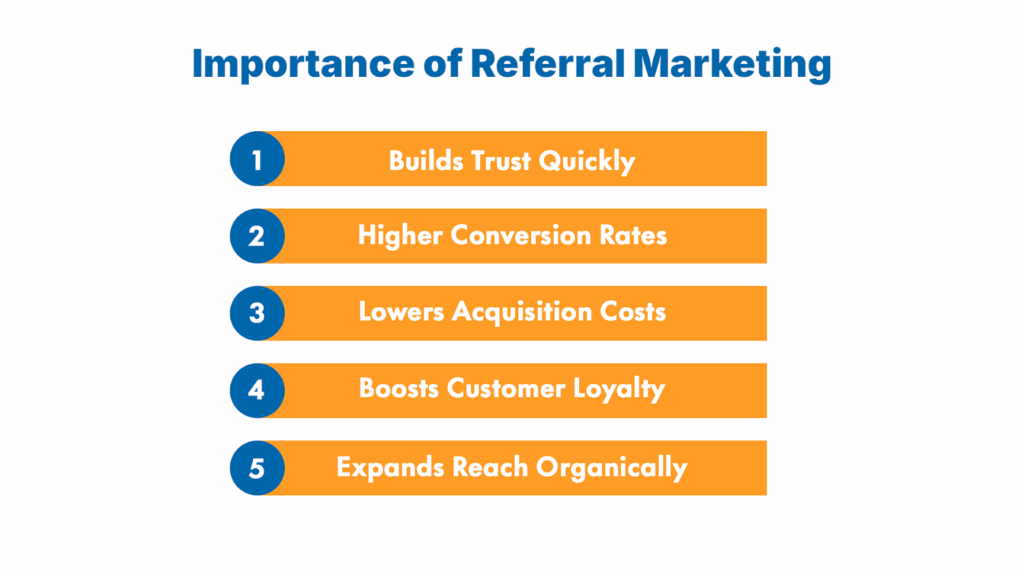
Referral marketing has become one of the most effective strategies for businesses aiming to grow organically and build lasting customer relationships.
- Builds Trust Quickly: According to studies, 83% of consumers trust referrals from people they know more than any other form of marketing, making referrals a powerful way to quickly build credibility for your brand.
- Higher Conversion Rates: Referred customers have a 37% higher retention rate and are four times more likely to convert compared to leads from other channels.
- Lowers Acquisition Costs: Referral marketing significantly reduces customer acquisition costs (CAC). Since happy customers promote your business for you, you spend less on expensive ad campaigns or cold outreach.
- Boosts Customer Loyalty: When customers receive rewards or recognition for referrals, it increases their emotional connection to your brand.
- Expands Reach Organically: Referral marketing turns each customer into a potential marketing channel, extending your reach to new networks without extra advertising spend.
Benefits of Referral Marketing
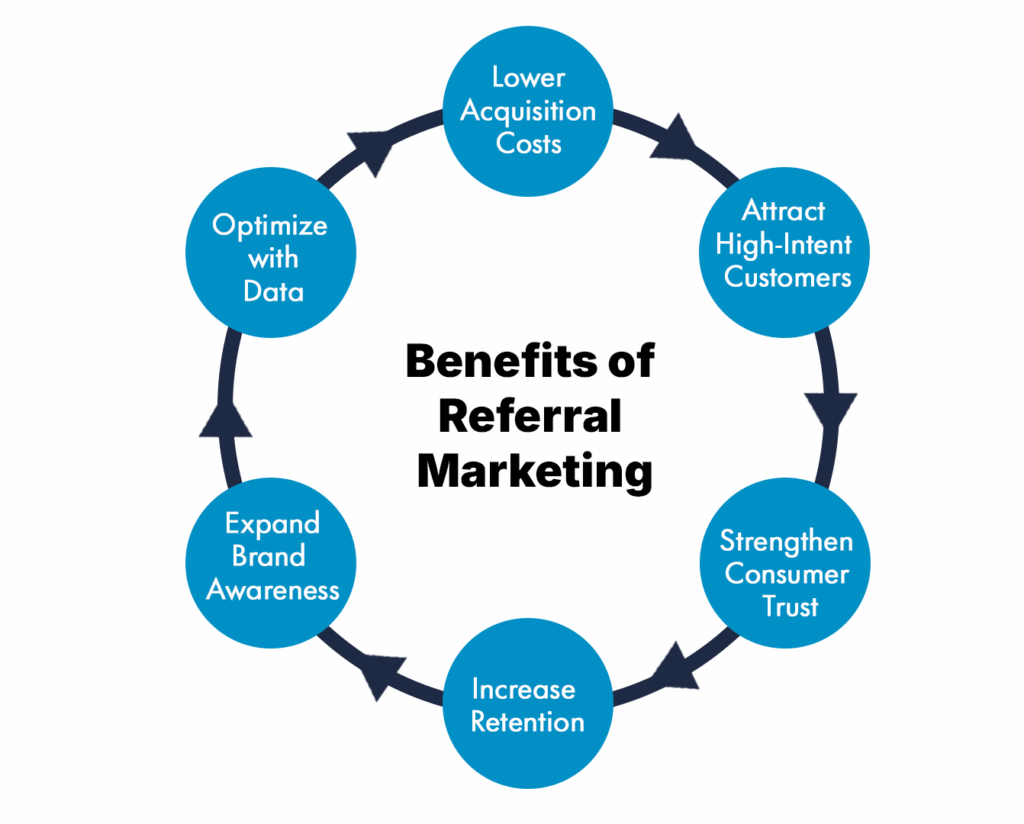
As consumers increasingly rely on recommendations from friends and family when making purchase decisions, businesses across various industries stand to gain by incorporating referral marketing into their strategies.
- Lower Acquisition Costs: Rather than competing heavily in the crowded digital advertising space, referral marketing encourages satisfied customers to promote your business for little to no expense.
- Attract High-Intent Customers: Referrers tend to recommend your brand to people who respect their opinions and often already have an interest in your offerings, helping you reach potential customers you might miss through traditional ads.
- Build Consumer Trust: Consumers tend to distrust typical marketing messages but place greater faith in recommendations from peers.
- Increase Retention: Referral marketing doesn’t just bring in new clients—it also helps retain existing ones.
- Expand Brand Awareness: Referral programs naturally increase your brand’s exposure. When customers share your brand within their networks, they extend your reach to people who might not have found your business otherwise.
- Optimize with Data: Tracking referral sources and performance helps you understand which customers and channels generate the most leads and conversions.
Conclusion
Building an effective referral program takes careful planning, clear objectives, and a customer-centric approach.
By setting measurable goals, offering appealing incentives, simplifying the referral process, and actively promoting your program, you create a seamless experience that encourages your customers to become enthusiastic advocates.
Don’t forget to continuously track your program’s performance and optimize based on data insights—this ongoing refinement ensures your referral strategy remains impactful and drives sustainable business growth.
With the right foundation, your referral program can become one of your most powerful marketing tools.
Deepak Wadhwani has over 20 years experience in software/wireless technologies. He has worked with Fortune 500 companies including Intuit, ESRI, Qualcomm, Sprint, Verizon, Vodafone, Nortel, Microsoft and Oracle in over 60 countries. Deepak has worked on Internet marketing projects in San Diego, Los Angeles, Orange Country, Denver, Nashville, Kansas City, New York, San Francisco and Huntsville. Deepak has been a founder of technology Startups for one of the first Cityguides, yellow pages online and web based enterprise solutions. He is an internet marketing and technology expert & co-founder for a San Diego Internet marketing company.

